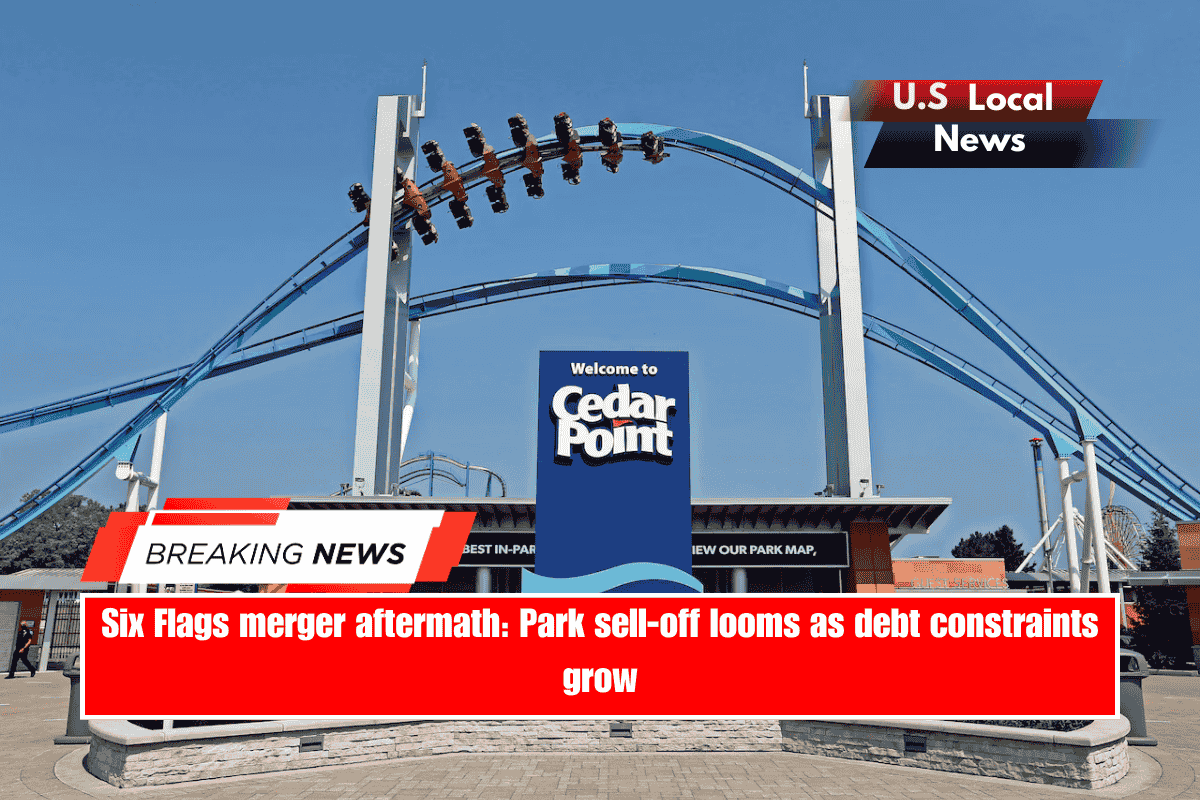SANDUSKY, Ohio — A year after the merger of Six Flags and Cedar Fair, the newly formed company is facing a reckoning. With attendance down 9%, revenue down $100 million, and debt up to $5 billion, executives are considering a massive park sell-off to stabilize the business.
The company has already announced the closure of Six Flags America in Maryland and the eventual closure of California’s Great America in 2027. Land surrounding Kings Dominion in Virginia is also available for sale. However, industry experts believe this is only the beginning.
Dennis Speigel, president of International Theme Park Services, believes that the company could sell half or more of its 42 parks.
“If I were running the company, there are 10 to 12 parks I would keep, pay off debt, and start over,” said Speigel, a former park manager at both Kings Dominion and Kings Island. He also stated that the company may be “on the verge of bankruptcy” if it does not act quickly.
Selling off a group of parks could provide immediate cash to pay down debt, much of which was accumulated during the COVID pandemic, when parks were closed for months and then operated at a fraction of their capacity.
Retaining a core group of strategically located parks—those with overlapping marketing and season pass bases—might result in a leaner, more profitable operating company. Experts believe that divesting underperforming or geographically isolated assets could reduce operating complexity and increase margins.
The eight largest parks in the chain, based on estimated attendance, include Southern California’s Knott’s Berry Farm (4.2 million in 2023), Ohio’s Cedar Point (4 million), Ohio’s Kings Island (3.5 million), California’s Six Flags Magic Mountain (3.4 million), Canada’s Wonderland (3.2 million), Illinois’ Six Flags Great America (3 million), New Jersey’s Six Flags Great Adventure (2.5 million), and Six Flags Mexico (2 million), according to Themed Entertainment.
Other parks that are unlikely to be closed include Carowinds in Charlotte, North Carolina, which houses Six Flags’ corporate headquarters, and Six Flags Over Texas in Arlington, the original park in the Six Flags chain.
Frontier City in Oklahoma City, Six Flags Darien Lake near Buffalo, New York, Valleyfair in Minneapolis, Worlds of Fun in Kansas City, Six Flags Great Escape in Albany, New York, and Michigan’s Adventure in Grand Rapids are among the parks that frequently appear on most-likely-to-sell lists. (Note: Six Flags operates, but does not own, several of these parks, including Frontier City and Darien Lake.
Citi Research analyst James Hardiman stated that “everything should be on the table as we think about asset sales,” but added that Cedar Point and other top parks were unlikely to be sold.
He emphasized that decisions will be based on both profitability and potential sales value. “How much are individual parks contributing to the bottom line and how much could they get for those?” he speculated. He cited Six Flags America as an example of a property that is probably worth more as real estate than as an amusement park.
Some parks may be sold to other amusement operators. Herschend Family Entertainment, which owns Dollywood in Tennessee and Silver Dollar City in Missouri, has recently acquired Pittsburgh’s Kennywood and a dozen other regional parks.
Carissa Baker, the head of the University of Central Florida’s theme park and attraction management program, said she did not anticipate a major sell-off. “I could see maybe this happening to one or two other properties,” she was saying.
The company has acknowledged that it is reviewing its portfolio for additional sales opportunities. “We’re also engaged in evaluating the rest of what we think is potential, given market conditions and how quickly we can move to potentially divest other things that we would consider noncore,” said outgoing President and CEO Richard Zimmerman in an earnings call last month.
In an emailed statement last week, Six Flags spokesman Gary Rhodes said the company remains confident in its ability to reduce debt “through the combination of organic growth in the business and the selective divestiture of noncore assets.”









